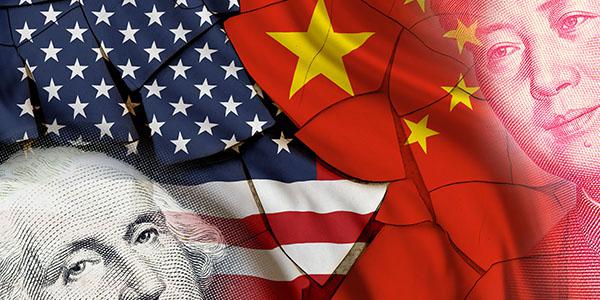China Poses Serious Threat in Outer Space and Cyberspace
From the virtual realm to zero gravity, China is posing a serious threat to U.S. national security that goes far beyond the Earth. With a strategic thrust designed to buttress and expand the reach of the Chinese Communist Party, the country is engaged in a long march for control that currently includes operations inside the United States as well as in orbit and beyond.
These were among several issues discussed at the Senate Select Committee on Intelligence hearing to examine worldwide threats. Coming on the heels of the release of the Office of the Director of National Intelligence (ODNI) 2021 “Annual Threat Assessment of the U.S. Intelligence Community,” testimony by five intelligence community heads laid bare how China is the top concern among many offered by the community.
“China is an unparalleled priority for the national security community,” stated Avril Haines, DNI. Russia, Iran and North Korea also are major players in the threat arena, but China’s actions come under particular scrutiny. “China increasingly is a near-peer competitor challenging the United States in multiple areas while pushing to revise global norms in ways that favor the authoritarian Chinese system.” She also highlighted China’s efforts to bend neighbors to its will.
China’s substantial cyber capabilities at a minimum can cause localized temporary disruptions to critical infrastructure within the United States, she continued. The cyberspace threat to the infrastructure as a whole continues to grow, noted Gen. Paul M. Nakasone, USA, commander, U.S. Cyber Command. “Our adversaries continue to get better at what they’re doing,” he stated. “We are also working very holistically across our government to improve two things: our ability to have resilience in that infrastructure; and our ability to respond, and we have made progress there.”
The issue of Chinese activity was expanded by FBI Director Christopher Wray. “I don’t think there is any country that presents a more severe threat to our innovation, our economic security and our democratic ideas than China,” Wray declared. “The tools in their toolbox to influence our businesses, our economic institutions, our governments at all levels are deep and wide and persistent.”
He related how China’s Operation Foxhunt resulted in U.S. indictments last year for uncoordinated, illegal law enforcement activity on U.S. soil. This activity aimed at threatening, harassing, blackmailing and intimidating members of the Chinese diaspora in the United States. “It’s an indication and illustration of just how challenging and diverse this particular threat is,” Wray pointed out, adding that more than 2,000 ongoing investigations can be tied back to the Chinese government. Economic espionage alone has generated a 1,300-percent increase in investigations over the past several years. “We’re opening a new investigation on China every 10 hours,” he stated.
And the economic threat to the United States also may come from above. China plans a commercial constellation of 138 Jilin-1 remote sensing satellites for global imaging, and the United States may need to prime its own commercial space infrastructure to compete. Haines stated, “There is just no question, as a general matter, that China is focused on achieving leadership in space … and has been working hard on a variety of different efforts in this area to try to contest what has been presumed our leadership in these areas.”
Haines added that the private sector has become increasingly important in U.S. efforts to counter challenges in space. “We have been working very hard to ensure that the policy community understands, and that we obviously support Space Force in its work, to promote U.S. leadership in space,” she pointed out.
The emergence of COVID-19 from Wuhan came under scrutiny, and the intelligence community leaders agreed that the virus’ actual origin remains undetermined. In response to a question from Sen. Marco Rubio (R-FL) that emphasized the cross-species work at the Wuhan Institute of Virology, Haines admitted that, “The intelligence community does not know exactly where, when or how COVID-19 virus was transmitted initially.” She cited two alternative theories: one, in which it emerged naturally through human contact with infected animals; and the other which came from a laboratory accident, noting Sen. Rubio’s comment that mentioned lax standards at the Wuhan lab.
Haines said the community continues to work on the issue, collecting information in the hope of generating greater confidence in an explanation. CIA Director William Burns added, “The one thing that is clear to us and to our analysts is that the Chinese leadership has not been fully forthcoming or fully transparent in working with the WHO or in providing the kind of original complete data that would help answer those questions.
“So we’re doing everything we can, using all the sources available to all of us on this panel to try to get to the bottom of it,” Burns declared.
Yet China’s goal of global domination is not yet a fait accompli, the panelists noted. Much remains to fall into place for them to be successful, and the road may not be as clear as they believe. Haines noted, “While China poses an increasingly formidable challenge to the U.S. role in global affairs, its economic, environmental and demographic vulnerabilities all threaten to complicate its ability to manage the transition to the dominant role it aspires in the decades ahead.”
The same holds true in economic competition, she pointed out. “There is no question that the Chinese have an advantage in some respects to their civil-military fusion approach to things. They’re capable of directing their private sector in ways that we simply do not do.
“That provides a short-term advantage, but it might not be a long-term advantage in the sense that the way we structure ourselves actually makes us capable of flexibility that, over time, sustains our private market in ways the Chinese don’t have,” she concluded.




Comments